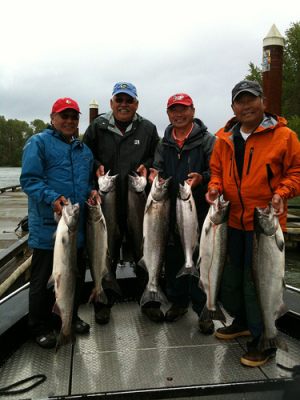forum
library
tutorial
contact

Washington Water Rule Will Be
Tough on Farmers, Group Warns
by Don Jenkins
Capital Press, May 6, 2016
|
the film forum library tutorial contact |

|
Washington Water Rule Will Be
by Don Jenkins
|
 By late this summer, Washington is expected to adopt new and higher water-quality standards that could eventually lead to more stringent regulations on agriculture, according to a Washington Farm Bureau official.
By late this summer, Washington is expected to adopt new and higher water-quality standards that could eventually lead to more stringent regulations on agriculture, according to a Washington Farm Bureau official.
Commonly known as the fish-consumption rule, the standards are meant to protect the long-term health of people who over their life spans eat large amounts of fish harvested in Washington.
Mandated by the Clean Water Act and written by the state Department of Ecology (DOE), the regulation will apply directly to industries with permits to discharge wastewater laced with one or more of nearly 100 chemicals.
The proposed rule, however, also retains a requirement that so-called "nonpoint pollution sources," such as runoff from cities and farms, meet the standards and authorizes DOE to set "best management practices" to ensure compliance.
Melissa Gildersleeve, a manager in the DOE water quality program, said the department has had that authority for decades. Farmers already are prohibited from discharging pollutants into waterways, and the new rule is focused on certain chemicals and companies with discharge permits, not farmers, she said.
The farm bureau, however, and other groups, including the Northwest Food Processors Association, argue that DOE has proposed overly strict standards, with far-reaching consequences.
"We agree that the rule, as proposed, will likely affect more than just (discharge) permit holders, because that's just the way the octopus that is the federal Clean Water Act works," the bureau's associate director of government relations, Evan Sheffels, said Thursday in an email.
Sheffels suggested DOE reinforce its assurances to farmers by stating in the rule that the standards will not affect agriculture.
"Down the road . . . the proposal will likely result in much more stringent regulation of nonpoint agriculture, too," Sheffels said. "So, yes, we are very concerned that these proposals will harm local food security and the long-term viability of agriculture."
The new water-quality standard will replace one set in 1992.
According to the proposed standard, a 176-pound person who eats 6.15 ounces of fish a day for 70 years will increase their chances of getting cancer by one in 1 million.
A person who drank 2.4 liters of untreated water every day for 70 years would face the same elevated risk.
The standard is currently that if a 154-pound person ate about 6.8 ounces of fish a month over 70 years, they would increase their chances of getting cancer by one in 1 million.
DOE says the current standard lowballs fish consumption, particularly among Native Americans, and doesn't take into account weight gains among the general population.
DOE last year proposed increasing the body weight to 176 pounds and the fish consumption to 6.15 ounces a day for 70 years, but increasing the cancer risk to one in 100,000.
The Environmental Protection Agency, conservation groups and tribes protested, and DOE withdrew the rule.
Industries are complaining that DOE has moved in the wrong direction.
"At some point, a level of risk that was considered to be 'essentially zero' has come to be identified as a maximum level of acceptable risk," stated Pamela Barrow, the food processors association's vice president for energy, environmental and sustainability, in a letter to DOE.
The Northwest Indian Fisheries Commission, a consortium of 20 tribes, said 6 ounces per day is less than the contemporary and historical consumption of tribal members. Habitat loss and chemical contamination have made fish and shellfish less available and suppressed consumption, according to the commission.
learn more on topics covered in the film
see the video
read the script
learn the songs
discussion forum
